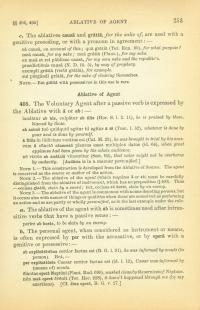404. The ablative (with or without a preposition) is used to express cause.1
Neglegentiā plectimur. (Lael. 85)
We are chastised for negligence.
Gubernātōris ars ūtilitāte nōn arte laudātur. (Fin. 1.42)
The pilot's skill is praised for its service, not its skill.
certīs dē causīs
for cogent reasons
ex vulnere aeger (Rep. 2.38)
disabled by (from) a wound
Mare ā sōle lucet. (Acad. 2.105)
The sea gleams in the sun (from the sun).
a. The Ablative of Cause without a preposition is used with labōrō (also with ex), exsiliō, exsultō, triumphō, lacrimō, and ārdeō.
Doleō tē aliīs malīs labōrāre. (Fam. 4.3)
I am sorry that you suffer with other ills.
cf. ex aere aliēnō labōrāre (B. C. 3.22)
to labor under debt (from another's money)
Exsultāre laetitiā, triumphāre gaudiō coepit. (Clu. 14)
She began to exult in gladness, and triumph in joy.
Exsiluī gaudiō. (Fam. 16.16)
I jumped for joy.
cf. Lacrimō gaudio. (Ter. Ad. 409)
I weep for joy.
ārdēre dolōre et īrā (Att. 2.19.5)
to be on fire with pain and anger
For gaudeō and glōrior, see § 431.
b. The motive which influences the mind of the person acting is expressed by the Ablative of Cause; the object exciting the emotion often by ob2 or propter with the Accusative.
nōn ob praedam aut spoliandī cupīdine (Tac. H. 1.63)
not for booty or through lust of plunder
Amīcitia ex sē et propter sē expetenda. (Fin. 2.83)
Friendship must be sought of and for itself.
Note— But these constructions are often confused.
pārēre lēgibus propter metum (Par. 34)
to obey the laws on account of fear
Here metum is almost equivalent to “the terrors of the law,” and hence propter is used, though the ablative would be more natural.
c. The ablatives causā and grātiā (for the sake of) are used with a Genitive preceding, or with a pronoun in agreement.
eā causā on account of this
Quā grātiā? (Ter. Eun. 99)
for what purpose?
meā causā for my sake
meā grātiā (Plaut.)
for my sake
ex meā et reī pūblicae causā for my own sake and the republic's
praedictiōnis causā (N. D. 3.5)
by way of prophecy
exemplī grātiā (verbī grātiā)
for example
suī pūrgāndī grātiā
for the sake of clearing themselves
Note— But grātiā with possessives in this use is rare.
Footnotes
2. Originally a mercantile use: cf. ob decem minās for the price of ten minæ.


